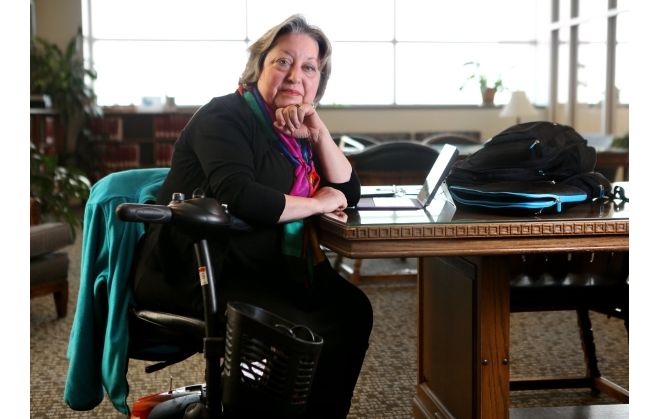
ERIC ALBRECHT | THE COLUMBUS DISPATCH
Columbus lawyer Pam Makowski, 58, unwittingly became dependent on the opioid painkiller Percocet by taking it as prescribed through a painful complication after hip-replacement surgery last year. “I didn’t crave it,” she said, yet she felt horrible if she didn’t take it.
After hip-replacement surgery and a couple of weeks in a rehab center, Columbus lawyer Pam Makowski was back at work. Colleagues who saw her pushing herself around the Franklin County courthouse in a wheelchair seemed impressed.
“You’re doing so great,” she often heard.
Makowski liked to respond with a joke. “Twenty milligrams of Percocet will make you feel great.”
There was no reason not to laugh, Makowski figured. She was following instructions for her recovery, which was being hindered by a painful complication that nearly paralyzed her leg, and taking the prescribed medication: A dose in the morning, another at noon, one in the evening and one before bed.
But by late summer, several weeks after her July surgery, Makowski realized that she was sweating at strangely regular times. A little more than three hours after taking the Percocet — the brand name of an opioid medication containing acetaminophen and oxycodone — she might be so drenched that she had to change clothes.
“I didn’t crave it,” the South Side resident said of the pain medication, yet she felt horrible if she didn’t take it.
The first doctor she turned to suspected hot flashes. Makowski, 58, noted that she was well past menopause.
She has had numerous health problems and sees different specialists. During a fall appointment with her rheumatologist, she posed the question that others had dismissed. His answer was both matter-of-fact and terrifying.
“You’re dependent on Percocet,” he said. “Your sweating is the first sign of withdrawal.”
Makowski routinely represents families and children whose lives have been wrecked by substance abuse. Now, she was the one who needed detox.
Mismanaging pain
Illicit activity isn’t the only driver of the nation’s crisis with opioid medications and heroin, experts say. Expectations about how people should feel in the wake of medical procedures or other health challenges have long shared the blame.
“Americans have been told that we can and should be pain-free,” said Constance Scharff, director of addiction research at the Cliffside Malibu Treatment Center in Los Angeles. “And doctors have been told that there are medications that will make that happen. That’s the root of the whole drug epidemic.”
Many doctors — who obviously don’t want their patients to suffer — have received little training about addiction, Scharff said. That can increase the risk of over-prescribing.
“What doctors depend on that just flat out doesn’t work is that you’ll know, and just take things as medically necessary,” she said. “Take them when you need them? You’re off and running.”
In his call for nearly $1.2 billion in new funding to fight opioid abuse, President Barack Obama noted that U.S. deaths linked to opioids hit 28,648 in 2014 — more than the number who died in automobile crashes. In Ohio, one of five states noted as especially hard hit, a record 2,482 people died of overdoses that year.
“There are reports that say America uses 80 percent of the world’s painkillers,” Scharff said. “We certainly don’t have 80 percent of the pain.”
Although physicians are fast becoming better educated, it’s also important for patients to request the least-aggressive options, said Dr. Sara McIntosh, medical director at the Maryhaven treatment center in Columbus. A high dose of ibuprofen three times a day “is often more effective for controlling pain than an opiate.”
Opioid dependence and addiction can take hold quickly, she said. “Then they need it just to feel normal.”
Looking for help
Makowski couldn’t find a doctor willing to monitor her as she tried to reduce her medication. Treatment centers were full, and she didn’t want to go on a waiting list.
She and her husband were angry, too. The physical-rehabilitation place where she had stayed after surgery “felt sorry for me,” she said. “They were just bringing the pills regularly.”
Makowski was sent home with enough to continue the same dosage schedule she’d had there. Combined with what she’d been prescribed previously, “I probably had 600 Percocets in my home,” she said. “That’s how freely it was given.”
By early November, with her son back at college, she decided to quit cold turkey. Someone in one of the doctors’ offices she had called said it would be like the flu. “But it wasn’t like the world’s worst flu,” Makowski said. “It was worse. There are no words to describe it.”
Moaning, sweating, racked with vomiting and diarrhea, “I was calling for my father, who had died, to intercede. I was calling to God.”
Experts don’t recommend detoxing without medical supervision, and Makowski doesn’t, either. By the third day, “I thought I had to be dying,” she said. “It took 2 1/2 weeks before I could go out.”
All she ever asked doctors, she says now, was “to take the edge off so that I could function. I didn’t have an expectation of being totally pain-free.”
Makowski is sharing her story in hopes that it helps others. Many aren’t so lucky, she knows, and move on to cheaper heroin when they can no longer get prescription medications.
“I don’t want to slam the entire medical profession,” she said. “I think I was not well-served. And a lot of people are not well-served.”


